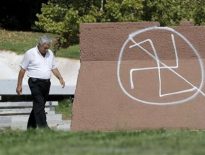AMSTERDAM (AP) — They left in secrecy on a private jet, bound for one of the world’s most dangerous places, to destroy substances so deadly that the smallest particle can kill within minutes. The inspectors for the Organization for the Prohibition of Chemical Weapons tasked with helping Syria destroy its chemical weapons have about nine months to find and dismantle an estimated 1,000-ton chemical arsenal that took years to build. It is the shortest deadline they have ever faced in any nation, and their first mission in a country at war.

Here’s a look at the details of their plan so far and the hurdles inspectors may face:
PRIORITY NO. 1 — DESTROY WEAPON CAPABILITIES WITHOUT GETTING POISONED
Sarin — suspected in the Aug. 21 attack that killed more than a thousand people outside Damascus — has a shelf life of about a week once it’s been made, so just disabling equipment used to mix chemical precursors will go a long way toward keeping civilians safe. Another important tactic is destroying missiles used to carry chemical weapons. Without a way to disperse them, deadly chemicals are all but useless in warfare.
THE SIMPLEST WAY TO DISABLE EQUIPMENT? SMASH IT!
Inspectors can use any means they deem necessary to render equipment inoperable, including techniques that are crude but effective. Options include: taking sledgehammers to control panels; driving tanks over empty vats or filling them with concrete; or running mixing machines without lubricant so they seize up and become inoperable.
SHHH! THE PLAN IS SECRET
After a brief layover at an undisclosed location, the first 20 inspectors will meet with officials in Syria’s foreign ministry by lunchtime Tuesday. Some will be double-checking Syria’s initial disclosure of what weapons and chemical precursors it has and where they are located. Others will begin planning the logistics for visits to every location where chemicals or weapons are stored — from trucks loaded with weapons up to full-on production sites.
Within a week a second wave of inspectors will arrive — fewer than 100 combined — and form teams that will fan out to individual sites. Their routes will be kept confidential — both for their safety and because Syria has the right not to reveal its military secrets, including base locations. Under OPCW rules, even the composition of its chemical arsenal won’t be disclosed publicly, though it is widely understood to contain mustard gas, Sarin and probably VX nerve gas. The OPCW has said not all inspection teams will arrive or depart via Damascus.
INSPECTORS FACE DANGERS: TOXIC CHEMICALS AND A WAR ZONE
Each group will need experts from different fields: Chemical analysts, manufacturing experts, munitions and military specialists, and health experts versed in the dangers of dealing with toxins. They must also have the medical expertise to lend emergency assistance in case of accident.
Syria will bear primary responsibility for inspectors’ safety, so they will be traveling with Syrian handlers. U.N. officials will also assist and may prove vital to negotiate passage through or near zones held by rebels.
THEY WILL SEEK AND DESTROY
Inspectors will verify what’s at each site by taking samples. They will also vet each site’s suitability as a future destruction center: road access, electricity, and water are all desirable features. Failing that, they will look at possibilities to transport material to a better location — or perhaps even bring in mobile destruction facilities built by the U.S. or Russia. Transporting material out of the country is also theoretically possible, but it’s not part of the current plan: exporting chemical weapons material would violate international law.
THE HARD PART IS GETTING RID OF BATTLE-READY WEAPONS
As Syria and the inspectors race to achieve the first milestone of rendering all mixing equipment inoperable by Nov. 1, back at headquarters, the OPCW will be drawing up plans for the next phase. That is, actually destroying battle-ready weapons and getting rid of precursor materials. That’s a time-consuming and expensive process, usually done by incinerating materials in sealed furnaces at ultra-high temperatures; or by transforming precursor chemicals or diluting them with water. Experts inside and outside the OPCW say the mid-2014 target for completion is ambitious, though none have said it’s outright impossible.
THERE’S PLENTY OF ROOM FOR INTRIGUE
The inspectors are empowered to conduct surprise visits to sites they suspect may contain undeclared weapons, and the U.N. resolution says they must be granted unfettered access. If Syria refuses, it will ultimately be up to the OPCW’s director general to decide whether the regime’s motive is legitimate — say due to military sensitivity of a site — or if Syria’s government is not sincere in its desire to get rid of all weapons, as Assad proclaimed he was on Sunday. Falling behind on timetables or disputes over access could easily escalate into political issues.
For now, the OPCW experts say that Syria’s declarations look reasonable, and preliminary contacts have been nothing but businesslike. If the facts on the ground later lead them to the conclusion Syria is not cooperating, they say they’ll be prepared to report that to the U.N. Security council without regard to the political consequences.





